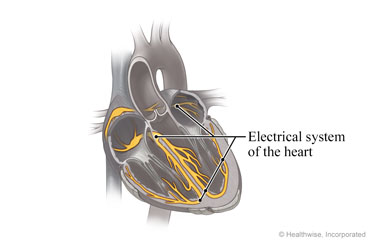
What is Brugada syndrome?
Brugada syndrome is a rare problem with the heart's electrical system. This system controls the speed and rhythm of your heartbeat. Brugada syndrome may cause your heartbeat to be very fast and abnormal. If this causes the heart to stop pumping blood normally, sudden death can happen. The syndrome often runs in families.
What causes it?
Brugada syndrome is caused by changes to some genes. These genes affect the electrical system that controls your heartbeat. If you have the syndrome, a fast and abnormal heartbeat can be set off when you use certain medicines, too much alcohol, or cocaine. It can also happen when you have a fever.
What are the symptoms?
Symptoms happen because the heart beats too fast. It can't pump enough blood to the rest of the body.
Symptoms include:
- Fainting.
- Palpitations. This is an uncomfortable feeling that your heart is beating too fast or with an abnormal rhythm. You might feel pounding or fluttering in your chest. Or you may feel like your heart skips a beat.
- Chest pain and pressure.
- Sudden gasping. This most often happens at night.
- Sudden cardiac arrest. This means that the heart suddenly stops beating.
How is it diagnosed?
Your doctor will do an electrocardiogram (EKG). It shows your heart's electrical activity as line tracings on paper. People with the syndrome have a certain pattern to their heartbeat. Your doctor can see the pattern on the tracing.
Sometimes the test doesn't show the pattern. If your doctor thinks you have Brugada syndrome, you may be given medicine before you have another EKG. The medicine can bring out the abnormal heartbeat during the test. This way the pattern can be seen on the tracing.
Your doctor may do tests to check for other heart diseases. The doctor will do a physical exam and ask about your symptoms and past health. The doctor may also ask if family members have symptoms or have been diagnosed with the syndrome. The doctor may also ask if any family members died suddenly and without warning. You may have a genetic test.
How is it treated?
The goal of treatment is to keep your heart beating normally and help improve symptoms. It's also to prevent sudden death.
Your doctor may suggest a device called an ICD (implantable cardioverter-defibrillator). It can detect an abnormal heartbeat and help bring back a normal rhythm. It is placed in the chest with minor surgery.
Your doctor might prescribe medicines. They can help control your heart's rhythm.
Sometimes a procedure called catheter ablation is used. It destroys tiny areas of the heart that cause the heart rhythm problem. It may make the abnormal heartbeat happen less often or stop it from happening again.
How can you care for yourself?
You can take steps to protect yourself from having an abnormal heart rhythm.
- Tell your doctors and pharmacist about your condition.
They can help you avoid medicines that can start a fast or abnormal heartbeat. These include some drugs for heart conditions and some antidepressants.
- Don't drink a lot of alcohol.
If you drink, limit alcohol to 2 drinks a day for men and 1 drink a day for women.
- Treat a fever right away.
Use medicines that reduce fever. These include ibuprofen, aspirin, and acetaminophen.
- Don't use cocaine.
Current as of: July 31, 2024
Author: Ignite Healthwise, LLC Staff
Clinical Review Board
All Healthwise education is reviewed by a team that includes physicians, nurses, advanced practitioners, registered dieticians, and other healthcare professionals.

